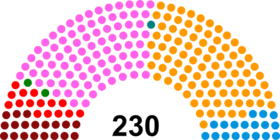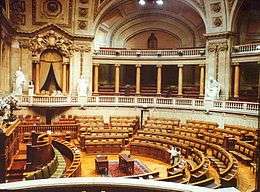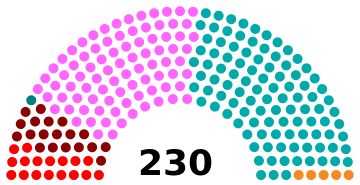Assembly of the Republic (Portugal)
| Assembly of the Republic Assembleia da República | |
|---|---|
 | |
| Type | |
| Type | |
| Leadership | |
| Structure | |
| Seats | 230 |
 | |
Political groups |
Government (86)
Supported by (36) Opposition (108) |
| Elections | |
|
Party-list proportional representation D'Hondt method Closed list | |
Last election | 4 October 2015 |
Next election | October 2019 or earlier |
| Meeting place | |
 | |
| São Bento Palace, Lisbon, Portugal | |
| Website | |
| Assembleia da República | |
 |
| This article is part of a series on the politics and government of Portugal |
| Constitution |
|
Legislative |
| Foreign relations |
|
Politics portal |
The Assembly of the Republic (Portuguese: Assembleia da República, pronounced: [ɐsẽˈblɐjɐ dɐ ʁɛˈpublikɐ]) is the Portuguese parliament.
According to the Portuguese Constitution, the unicameral Assembly "is the representative assembly of all Portuguese citizens." The constitution names the assembly as one of the country's organs of supreme authority.
It is located in a historical building in Lisbon, referred to as Palácio de São Bento (Saint Benedict Palace), the site of an old Benedictine monastery. The Palácio de São Bento has been the seat of the Portuguese parliaments since 1834 (Cortes until 1910, Congress from 1911 to 1926 and National Assembly from 1933 to 1974).
Powers and duties of the Assembly
The Assembly of the Republic's powers derives from its power to dismiss a government through a vote of no confidence, to change the country's laws, and to amend the constitution (this one requires a majority of two-thirds). In addition to these key powers, the constitution grants to the Assembly extensive legislative powers and substantial control over the budget, the right to authorize the government to raise taxes and grant loans, the power to ratify treaties and other kinds of international agreements, and the duty to approve or reject decisions by the President of the Republic to declare war and make peace. The assembly also appoints many members of important state institutions, such as ten of the thirteen members of the Constitutional Court and seven of the sixteen members of the Council of State.
The constitution requires the assembly to quickly review and approve an incoming government's program. Parliamentary rules allow the assembly to call for committees of inquiry to examine the government's actions. Political opposition represented in the assembly has the power to review the cabinet's actions, even though it is unlikely that the actions can be reversed. Party groups can also call for interpellations that require debates about specific government policies.
Structure
The assembly consisted at first of 250 members, but the constitutional reforms of 1989 reduced its number to between 180 and 230. Members are elected by popular vote for legislative terms of four years from the country's twenty-two constituencies (eighteen in mainland Portugal corresponding to each district, one for each autonomous regions, Azores (Portuguese: Açores) and Madeira, one for Portuguese living in Europe and a last one for those living in the rest of the world. Except for the constituencies for Portuguese living abroad, which are fixed at two members each, the number of voters registered in a constituency determines the number of its members in the assembly, using the D'Hondt method of proportional representation. Constituencies vary greatly in size; from as large as the district of Lisbon, which returns 48 representatives, to as small as the district of Portalegre, which elects just two.
According to the constitution, members of the assembly represent the entire country, not the constituency from which they are elected. This directive has been reinforced in practice by the strong role of political parties in regard to members of the assembly. Party leadership, for example, determines in which areas candidates are to run for office, thus often weakening members' ties to their constituencies. Moreover, members of the assembly are expected to vote with their party and to work within parliamentary groups based on party membership. Party discipline is strong, and insubordinate members can be coerced through a variety of means. A further obstacle to members' independence is that their bills first have to be submitted to the parliamentary groups, and it is these groups' leaders who set the assembly's agenda.
The President of the Assembly of the Republic is the second hierarchical figure in the Portuguese state, after the President of the Portuguese Republic, and is usually nominated by the party that holds the majority of the seats. The President of the Assembly is aided by four vice-presidents, nominated by the other parties represented in the parliament, and is usually the speaker. When he is not present, one of the vice-presidents takes the role of speaker. When the President of the Republic is, for any reason, unable to perform to job, the President of the Assembly of the Republic becomes his substitute.
Latest election
 | ||||||||||
| Parties | Votes | % | ±pp swing | MPs | MPs %/ votes % | |||||
|---|---|---|---|---|---|---|---|---|---|---|
| 2011 | 2015 | ± | % | ± | ||||||
| Portugal Ahead (PSD / CDS-PP) | 1,993,921 | 36.86 | 124 | 102 | 44.35 | 1.20 | ||||
| Socialist Party | 1,747,685 | 32.31 | 74 | 86 | 37.39 | 1.16 | ||||
| Left Bloc | 550,892 | 10.19 | 8 | 19 | 8.26 | 0.81 | ||||
| Unitary Democratic Coalition | 445,980 | 8.25 | 16 | 17 | 7.39 | 0.90 | ||||
| Social Democratic | 81,054 | 1.50 | N/A | 7 | 5 | 2.17 | 1.45 | |||
| People-Animals-Nature | 75,140 | 1.39 | 0 | 1 | 0.43 | 0.31 | ||||
| Democratic Republican | 61,632 | 1.14 | N/A | N/A | 0 | N/A | 0.00 | N/A | 0.0 | |
| Workers' Communist Party | 59,955 | 1.11 | 0 | 0 | 0.00 | 0.0 | ||||
| FREE/Time to move Foward | 39,340 | 0.73 | N/A | N/A | 0 | N/A | 0.00 | N/A | 0.0 | |
| National Renovator Party | 27,269 | 0.50 | 0 | 0 | 0.00 | 0.0 | ||||
| Earth Party | 22,596 | 0.42 | 0 | 0 | 0.00 | 0.0 | ||||
| We, the Citizens! | 21,439 | 0.40 | N/A | N/A | 0 | N/A | 0.00 | N/A | 0.0 | |
| Labour / Socialist Alternative (ACT!) | 20,749 | 0.38 | N/A | N/A | 0 | N/A | 0.00 | N/A | 0.0 | |
| People's Monarchist | 14,897 | 0.28 | 0 | 0 | 0.00 | 0.0 | ||||
| Together for the People | 14,285 | 0.26 | N/A | N/A | 0 | N/A | 0.00 | N/A | 0.0 | |
| United Party of Retirees and Pensioners | 13,979 | 0.26 | N/A | N/A | 0 | N/A | 0.00 | N/A | 0.0 | |
| People's | 7,536 | 0.14 | N/A | 1 | 0 | 0.00 | 0.0 | |||
| People's / People's Monarchist | 3,654 | 0.07 | N/A | 0 | 0 | 0.00 | 0.0 | |||
| Christian Democratic and Citizenship | 2,659 | 0.05 | 0 | 0 | 0.00 | 0.0 | ||||
| Labour | 1,748 | 0.03 | N/A | 0 | 0 | 0.00 | 0.0 | |||
| Total valid | 5,206,410 | 96.25 | 230 | 230 | 100.00 | — | ||||
| Blank ballots | 112,851 | 2.09 | ||||||||
| Invalid ballots | 89,544 | 1.66 | ||||||||
| Total (turnout 55.86%) | 5,408,805 | 100.00 | ||||||||
| Source: Legislativas 2015 | ||||||||||
Distribution by constituency

| Constituency | % | S | % | S | % | S | % | S | % | S | % | S | Total S |
|---|---|---|---|---|---|---|---|---|---|---|---|---|---|
| PàF | PS | BE | CDU | PSD | PAN | ||||||||
| Azores | - | - | 40.3 | 3 | 7.8 | - | 2.5 | - | 36.1 | 2 | 0.9 | - | 5 |
| Aveiro | 48.1 | 10 | 27.9 | 5 | 9.6 | 1 | 4.4 | - | - | - | 1.0 | - | 16 |
| Beja | 20.1 | 1 | 37.3 | 1 | 8.2 | - | 25.0 | 1 | - | - | 0.8 | - | 3 |
| Braga | 45.6 | 10 | 30.9 | 7 | 8.8 | 1 | 5.2 | 1 | - | - | 0.8 | - | 19 |
| Bragança | 49.4 | 2 | 34.1 | 1 | 5.5 | - | 3.1 | - | - | - | 0.6 | - | 3 |
| Castelo Branco | 35.3 | 2 | 38.9 | 2 | 10.0 | - | 6.0 | - | - | - | 0.8 | - | 4 |
| Coimbra | 37.2 | 4 | 35.3 | 4 | 9.9 | 1 | 7.0 | - | - | - | 1.0 | - | 9 |
| Évora | 23.9 | 1 | 37.5 | 1 | 8.6 | - | 21.9 | 1 | - | - | 0.9 | - | 3 |
| Faro | 31.5 | 3 | 32.8 | 4 | 14.1 | 1 | 8.7 | 1 | - | - | 2.0 | - | 9 |
| Guarda | 45.6 | 2 | 33.8 | 2 | 7.4 | - | 4.0 | - | - | - | 0.9 | - | 4 |
| Leiria | 48.4 | 6 | 24.8 | 3 | 9.7 | 1 | 5.1 | - | - | - | 1.2 | - | 10 |
| Lisbon | 34.7 | 18 | 33.5 | 18 | 10.9 | 5 | 9.8 | 5 | - | - | 2.0 | 1 | 47 |
| Madeira | - | - | 20.9 | 2 | 10.7 | 1 | 3.6 | - | 37.8 | 3 | 1.8 | - | 6 |
| Portalegre | 27.6 | 1 | 42.4 | 1 | 9.2 | - | 12.2 | - | - | - | 0.8 | - | 2 |
| Porto | 39.6 | 17 | 32.7 | 14 | 11.1 | 5 | 6.8 | 3 | - | - | 1.6 | - | 39 |
| Santarém | 35.8 | 4 | 32.9 | 3 | 10.8 | 1 | 9.6 | 1 | - | - | 1.2 | - | 9 |
| Setúbal | 22.6 | 5 | 34.3 | 7 | 13.1 | 2 | 18.8 | 4 | - | - | 1.9 | - | 18 |
| Viana do Castelo | 45.5 | 4 | 29.8 | 2 | 8.0 | - | 5.2 | - | - | - | 0.9 | - | 6 |
| Vila Real | 51.0 | 3 | 33.1 | 2 | 5.2 | - | 3.0 | - | - | - | 0.6 | - | 5 |
| Viseu | 51.1 | 6 | 29.7 | 3 | 6.7 | - | 3.5 | - | - | - | 0.7 | - | 9 |
| Europe | 39.1 | 1 | 29.9 | 1 | 5.8 | - | 5.9 | - | - | - | 0.9 | - | 2 |
| Rest of the World | 48.5 | 2 | 10.8 | - | 1.6 | - | 1.5 | - | - | - | 1.8 | - | 2 |
| Total | 36.9 | 102 | 32.3 | 86 | 10.2 | 19 | 8.3 | 17 | 1.5 | 5 | 1.4 | 1 | 230 |
| Source: Legislativas 2015 | |||||||||||||
Presidents of the Assembly of the Republic
Members
| |||||||||||||
See also
Notes
External links
| ||||||||||||||||||||||
| ||||||||||||||||||||||||||||||
|